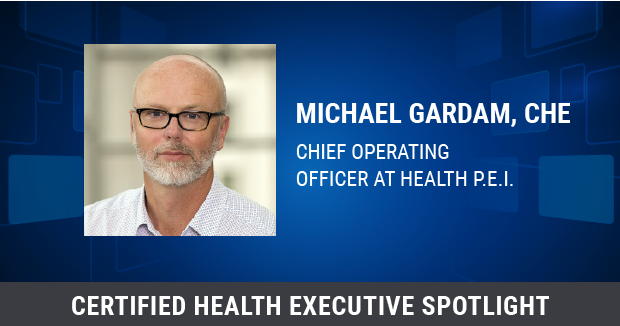At the heart of the College are our amazing Certified Health Executive (CHE) members. Our new monthly ‘CHE Spotlights’ celebrates them and their achievements as health leaders. Learn more about what inspires these exceptional leaders and what makes them tick. From leaders in mental health and wellness, equity diversity and inclusiveness (EDI), to mentors and emerging leaders, our CHE members are dedicated to life-long learning and leadership in healthcare.
This month, we are honoured to highlight Dr. Michael Gardam, a national expert infectious disease physician who is the Chief Operating Officer (COO) at Health P.E.I. and also works with the Women’s College Hospital and the Toronto Grace Health Centre. Michael joined the College in 2019 and received his CHE designation the following year.
“I have seen both good and bad leadership during the pandemic. Good leadership helps people get through this by knowing they are supported, valued, and listened to.”
Career
When Michael was asked why he chose to pursue a career in healthcare, his answer was that ultimately, he wanted to help people. Early in his career, he became interested in transforming systems, which attracted him towards completing his MHA at the University of Toronto and resulted in leadership roles, such as Chair of the Medical Advisory Committee at the University Health Network (UHN) in Toronto, a member of the Board of Directors at UHN, and Chief of Staff at Humber River Hospital, to name but a few. Michael also put into place a world-renowned Infection Prevention and Control program. He has consulted for international organizations in complex healthcare environments, with the goal of driving change and helping to uncover innovative solutions to medical challenges.
As the current Chief Operating Officer at Health P.E.I., he finds himself well-positioned to transform the healthcare system.
As the Coronavirus pandemic sweeps across the globe at a lightning-quick rate and affects Canadians, there is rampant fear and uncertainty regarding how to best protect ourselves and our loved ones. Health leaders, such as Michael, are further tasked with guiding their teams and organizations through this highly volatile and threatening crisis and with striving for the delicate balance between prioritizing the safety of their staff, while still providing the best care possible for those in need. In March of 2020, Michael discussed the pandemic and effective strategies that health leaders can apply directly to their work in a CCHL webinar entitled Leading in Turbulent Times: How to Guide your Teams Through the Coronavirus Pandemic – #COVID19. This webinar sparked the CCHL’s ongoing research on leadership during and following the pandemic.
CCHL and the CHE Credential
Michael’s advice to aspiring health leaders and to new College members is to treat leadership as its own topic and area that needs to be learned. He says, “In particular, physicians are often not trained in leadership, yet we are all expected to be leaders to some degree just by the nature of having an MD degree.” Harvard professor Barbara Kellerman agrees and advocates in her book Professionalizing Leadership that leadership should be elevated to the status of the other traditional professions, with the corresponding mandatory preparation and expected standards of conduct.
For Michael, holding the CHE designation demonstrates an appreciation for leadership development and for the impact that effective leadership has at all levels of an organization. It shows one’s commitment to leadership in healthcare, to lifelong learning, and to a respect for the positive impact that doctors can have as leaders, beyond their clinical practice.
To conclude this month’s CHE Spotlight, we would like share one of Michael’s favourite sayings that he learned several years ago as a consultant. “You can’t fatten (or milk) a cow by weighing it.” He says that we do a lot of measurement in healthcare, but frequently don’t have a plan on how to act on the results and that collecting data is only part of the way forward. Leadership involves using data of all kinds – clinical outcomes, patient feedback, staff recommendations – to continuously improve the care we provide to those whom we are tasked to serve.
On behalf of the College, we would like to thank Michael for taking time out of his extremely busy schedule to share his experience and perspectives with the Canadian College of Health Leaders’ members.



